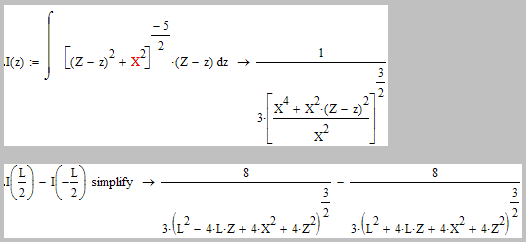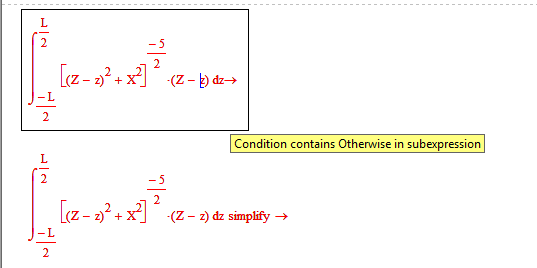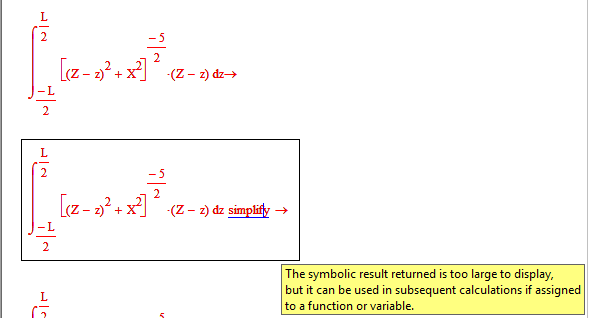Community Tip - Have a PTC product question you need answered fast? Chances are someone has asked it before. Learn about the community search. X
- Subscribe to RSS Feed
- Mark Topic as New
- Mark Topic as Read
- Float this Topic for Current User
- Bookmark
- Subscribe
- Mute
- Printer Friendly Page
Definite Integral Issue with Mathcad 15
- Mark as New
- Bookmark
- Subscribe
- Mute
- Subscribe to RSS Feed
- Permalink
- Notify Moderator
Definite Integral Issue with Mathcad 15
Hi there,
Not sure if I have an incorrect implementation/setup or if it's some kind of bug...
If I perform the following in Mathcad 2001i, it works instantly:
If I perform the same in Mathcad 15 it will not solve and I eventually I get the message "Condition contains Otherwise in subexpression".
I have attached the files I have been using for your perusal.
Solved! Go to Solution.
- Labels:
-
Calculus_Derivatives
Accepted Solutions
- Mark as New
- Bookmark
- Subscribe
- Mute
- Subscribe to RSS Feed
- Permalink
- Notify Moderator
I agree with Richard and others that integrals and especially definite integrals alway were a nightmare when the symbolics changed to MuPad. I still remember the many clearly wrong results of rather simple definite Integrals in Mathcad 14 and the some even in the first release of MC15.
This one here is really bad, especially given that its an easy one and consequently the indefinite interal is no problem, not even for Mupad.
That way we can create a workaround here:

The problem may arise because Mupad defaults to domain complex and that way probably has to make more distinction of cases as we may think of. Not sure about that, though.
If I tell Mathcad/MuPad that all variables are real and positive, I get a result but its frightening and takes quite long to calculate! I am not even sure its correct and equivalent to the above. Not sure whats going on here.
 .......
.......
- Mark as New
- Bookmark
- Subscribe
- Mute
- Subscribe to RSS Feed
- Permalink
- Notify Moderator
I also get an error message, looks like a bug to me.
- Mark as New
- Bookmark
- Subscribe
- Mute
- Subscribe to RSS Feed
- Permalink
- Notify Moderator
Thanks.
Wasn't sure if I had any settings at error within the worksheet. I don't think I do, I literally loaded Mathcad and entered the equation.
If it is a bug - do the PTC devs look in on these forums? Or would I need to submit to somewhere first?
Thankyou.
- Mark as New
- Bookmark
- Subscribe
- Mute
- Subscribe to RSS Feed
- Permalink
- Notify Moderator
Mike Shaw wrote:
Thanks.
If it is a bug - do the PTC devs look in on these forums? Or would I need to submit to somewhere first?
Thankyou.
I think you will have to raise a Customer Support call to the Technical Support department. See http://www.ptc.com/cs/doc/copen.htm for how to contact PTC technical support.
- Mark as New
- Bookmark
- Subscribe
- Mute
- Subscribe to RSS Feed
- Permalink
- Notify Moderator
Thankyou. It seems I have to upgrade my Account (I purchased a Student Version for Open University work), but I don't have a Customer Number...
- Mark as New
- Bookmark
- Subscribe
- Mute
- Subscribe to RSS Feed
- Permalink
- Notify Moderator
Unfortunately I do not have those privileges either. Maybe someone who doe will report it for you. VladimirN.
is usually very helpful in these situations.
- Mark as New
- Bookmark
- Subscribe
- Mute
- Subscribe to RSS Feed
- Permalink
- Notify Moderator
Mathcad 2001i has a Maple symbolic engine![]()
Mathcad 13-15 - MuPad symbolic engine![]()
But Maple is Maple - the best symbolic tool!
- Mark as New
- Bookmark
- Subscribe
- Mute
- Subscribe to RSS Feed
- Permalink
- Notify Moderator
Interesting, I didn't know that - thankyou.
- Mark as New
- Bookmark
- Subscribe
- Mute
- Subscribe to RSS Feed
- Permalink
- Notify Moderator
The MuPad symbolic engine has always been very weak when it comes to integrals, and especially definite integrals. In this case it can solve the indefinite integral, but not the definite integral, which is not logical. This is not the first example I've seen where this is the case though.
At a minimum, the error message is clearly a bug.
- Mark as New
- Bookmark
- Subscribe
- Mute
- Subscribe to RSS Feed
- Permalink
- Notify Moderator
Richard Jackson wrote:
The MuPad symbolic engine has always been very weak when it comes to integrals, and especially definite integrals. In this case it can solve the indefinite integral, but not the definite integral, which is not logical. This is not the first example I've seen where this is the case though.
Interesting. That's definitely something to bear in mind.
At a minimum, the error message is clearly a bug.
Maybe, Maybe Not. At a Mathcad level, probably, but it's possibly telling us something the internal error that MuPad encountered.
Stuart
- Mark as New
- Bookmark
- Subscribe
- Mute
- Subscribe to RSS Feed
- Permalink
- Notify Moderator
I agree with Richard and others that integrals and especially definite integrals alway were a nightmare when the symbolics changed to MuPad. I still remember the many clearly wrong results of rather simple definite Integrals in Mathcad 14 and the some even in the first release of MC15.
This one here is really bad, especially given that its an easy one and consequently the indefinite interal is no problem, not even for Mupad.
That way we can create a workaround here:

The problem may arise because Mupad defaults to domain complex and that way probably has to make more distinction of cases as we may think of. Not sure about that, though.
If I tell Mathcad/MuPad that all variables are real and positive, I get a result but its frightening and takes quite long to calculate! I am not even sure its correct and equivalent to the above. Not sure whats going on here.
 .......
.......
- Mark as New
- Bookmark
- Subscribe
- Mute
- Subscribe to RSS Feed
- Permalink
- Notify Moderator
I have the following result (as in MC2001i) by using "simplify" and "assume" symbolical operators in the MC15 F000 service release:



- Mark as New
- Bookmark
- Subscribe
- Mute
- Subscribe to RSS Feed
- Permalink
- Notify Moderator
In MC15 030 I get something different:

If I add z to the list I get the desired result:

If I also add L to the list I get a big, ugly answer that's similar to, but not the same as, the one Werner shows.
So the trick seems to be to force the domain of all the variables in the kernal, but not the limits.
- Mark as New
- Bookmark
- Subscribe
- Mute
- Subscribe to RSS Feed
- Permalink
- Notify Moderator
Major symbolic weirdness! I just did it again. If I have only Z and X in the list I get the incomplete solution. Then I copy and paste the expression and add z to the list, and I get the desired solution. BUT, if I then disable calculation for the first expression and enable it again, it also gives the desired solution!
- Mark as New
- Bookmark
- Subscribe
- Mute
- Subscribe to RSS Feed
- Permalink
- Notify Moderator
Richard Jackson wrote:
Major symbolic weirdness! I just did it again. If I have only Z and X in the list I get the incomplete solution. Then I copy and paste the expression and add z to the list, and I get the desired solution. BUT, if I then disable calculation for the first expression and enable it again, it also gives the desired solution!
Does that mean it's Friday?
- Mark as New
- Bookmark
- Subscribe
- Mute
- Subscribe to RSS Feed
- Permalink
- Notify Moderator
![]() . Good point. Maybe this doesn't happen except on certain days. With Mathcad symbolics almost anything is possible!
. Good point. Maybe this doesn't happen except on certain days. With Mathcad symbolics almost anything is possible!
Actually, I think I have seen this kind of "memory" behavior before, but not in a way where I could reproduce it at will.





